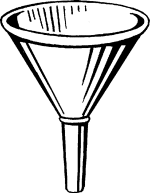
|
|||||||||||||||||||||||||||||||||||||||||||||||||||||
|
The Internet is a bunch of pipes and tunnels with processors located at the junctions and at the ends of the pipes. Some of the processors are little things like iPhones, routers, blogs or webcams. Some are huge like Google's cloud. All is good until something comes along that tries to get the whole Internet to flow through it. Compelling things that get more compelling the more stuff you flow through them. Instead of being shaped like pipes, they are shaped like funnels (as illustrated to the right). Platforms that are owned by companies start out as funnels. They may trick you for a while into believing that they made of pipes, after all it would be suicide for the platform owner to turn the lovely ecosystem into a funnel, but companies can't help themselves. They compete internally to control resources and to the people inside the company, the platform looks like just another resource to fight over. Eventually it gets funnelized, if it wasn't from the start. This is why my current motto about Twitter is "How I learned to stop worrying and love the Fail Whale." I can love the Fail Whale, even though as a user I hate it, because it says to me that I will soon control my own destiny in this space. That cute little whale says the idea of Twitter as a funnel (it started out as one, always has been one) is not working. As the network grows, it becomes less viable. The funnel is also why I don't like a lot of the things Google does. Things like SideWiki that are only useful when everyone uses them. It shows funnel-oriented thinking over there. Long-term they can't make the funnel work. But as Microsoft showed us in the 90s, they can slow the rest of us down while we wait for the shakeout. Better if they never tried, imho. Better for them, for us, and esp for the Internet. |
My Projects
"The protoblogger." - NY Times.
"The father of modern-day content distribution." - PC World.
One of BusinessWeek's 25 Most Influential People on the Web. "Helped popularize blogging, podcasting and RSS." - Time.
"The father of blogging and RSS." - BBC.
"RSS was born in 1997 out of the confluence of Dave Winer's 'Really Simple Syndication' technology, used to push out blog updates, and Netscape's 'Rich Site Summary', which allowed users to create custom Netscape home pages with regularly updated data flows." - Tim O'Reilly.
My most recent trivia on Twitter. On This Day In: 2008 2007 2006 2005 2004 2003 2002 2001 2000 1999 1998 1997. |
||||||||||||||||||||||||||||||||||||||||||||||||||||
|
© Copyright 1997-2009 Dave Winer. Previous / Next |
|||||||||||||||||||||||||||||||||||||||||||||||||||||

